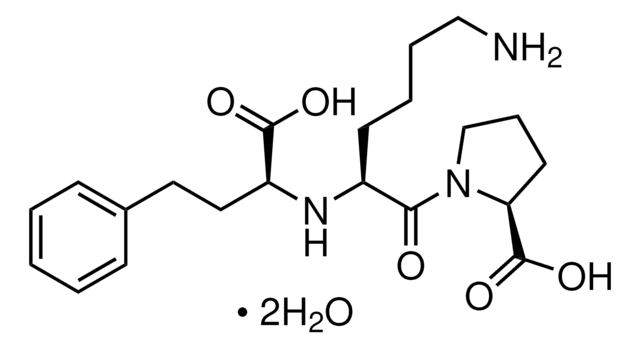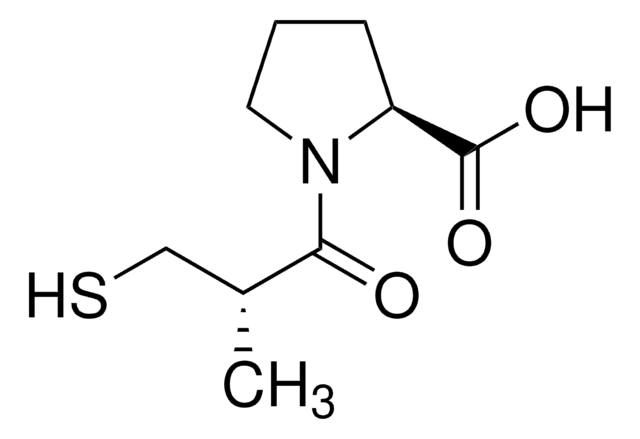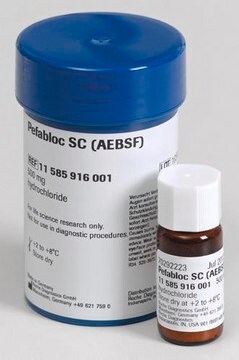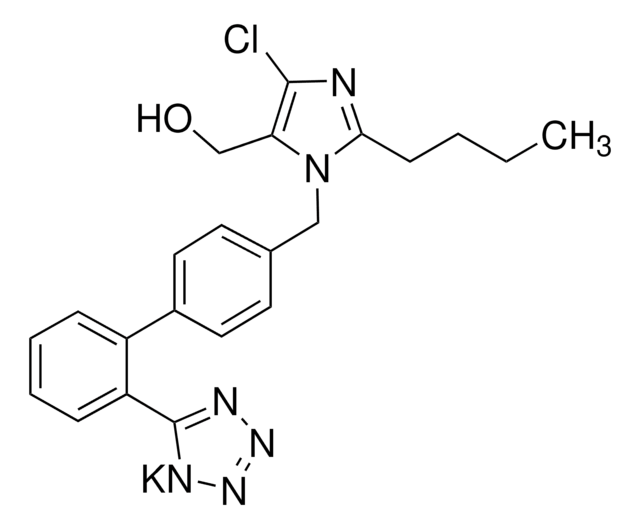L2777
Lisinopril
ACE Inhibitor
Synonim(y):
(S)-Nα-(1-Carboxy-3-phenylpropyl)-Lys-Pro
Zaloguj sięWyświetlanie cen organizacyjnych i kontraktowych
About This Item
Polecane produkty
Opis ogólny
Lisinopril is a nonsulfhydryl angiotensin-converting enzyme (ACE) inhibitor. It is used in the treatment of heart failure and hypertension. Lisinopril is an antihypertensive and anticongestive agent, like other members of its family. It is water-soluble and possesses weak chelating properties.
Zastosowanie
Lisinopril has been used as an angiotensin-converting enzyme (ACE) inhibitor:
- in combination with spironolactone, to study their effects on cardiac and skeletal muscles in the Duchenne muscular dystrophy (DMD) mice model
- standard in in vitro ACE inhibitory assay
- as a negative control in ACE enzymatic assay
This page may contain text that has been machine translated.
Hasło ostrzegawcze
Danger
Zwroty wskazujące rodzaj zagrożenia
Zwroty wskazujące środki ostrożności
Klasyfikacja zagrożeń
Repr. 1A - STOT RE 2
Organy docelowe
Kidney
Kod klasy składowania
6.1C - Combustible acute toxic Cat.3 / toxic compounds or compounds which causing chronic effects
Klasa zagrożenia wodnego (WGK)
WGK 2
Temperatura zapłonu (°F)
Not applicable
Temperatura zapłonu (°C)
Not applicable
Środki ochrony indywidualnej
Eyeshields, Gloves, type N95 (US)
Certyfikaty analizy (CoA)
Poszukaj Certyfikaty analizy (CoA), wpisując numer partii/serii produktów. Numery serii i partii można znaleźć na etykiecie produktu po słowach „seria” lub „partia”.
Masz już ten produkt?
Dokumenty związane z niedawno zakupionymi produktami zostały zamieszczone w Bibliotece dokumentów.
Klienci oglądali również te produkty
Comparative Effects of Low and High Doses of the
Angiotensin-Converting Enzyme Inhibitor, Lisinopril, on
Morbidity and Mortality in Chronic Heart Failure
Angiotensin-Converting Enzyme Inhibitor, Lisinopril, on
Morbidity and Mortality in Chronic Heart Failure
Milton Packer
Clinical and Investigative Medicine. Medecine Clinique Et Experimentale (2017)
E J Wallis et al.
Clinical pharmacology and therapeutics, 64(4), 439-449 (1998-11-03)
The antihypertensive response to angiotensin-converting enzyme (ACE) inhibitors may be attenuated by a compensatory decrease in atrial natriuretic factor production. If so, inhibition of atrial natriuretic factor breakdown by neutral endopeptidase (NEP) may enhance the antihypertensive effects of ACE inhibition.
Angiotensin converting enzyme inhibitors and moderate hypertension.
McAreave and Robertson Jl
Drugs (1990)
R L Hamlin et al.
Journal of veterinary internal medicine, 12(2), 93-95 (1998-04-30)
This study was designed to determine the degree of inhibition of the angiotensin-converting enzyme (ACE) in 5 normal dogs given single doses of conventionally used ACE inhibitors (ACEis). In addition the time required for that inhibition to return to 50%
M L Ricketts et al.
Clinical science (London, England : 1979), 96(6), 669-675 (1999-05-21)
In the kidney and colon 11beta-hydroxysteroid dehydrogenase type 2 (11beta-HSD2) inactivates cortisol to cortisone, thereby protecting the non-selective mineralocorticoid receptor from cortisol. Deficiency of 11beta-HSD2 results in cortisol-mediated sodium retention and hypertension, suggesting that the physiological regulation of 11beta-HSD2 in
Nasz zespół naukowców ma doświadczenie we wszystkich obszarach badań, w tym w naukach przyrodniczych, materiałoznawstwie, syntezie chemicznej, chromatografii, analityce i wielu innych dziedzinach.
Skontaktuj się z zespołem ds. pomocy technicznej

![N-[3-(2-Furyl)acryloyl]-Phe-Gly-Gly](/deepweb/assets/sigmaaldrich/product/structures/225/349/530bc714-b1a8-4fdb-8082-a39329ee730a/640/530bc714-b1a8-4fdb-8082-a39329ee730a.png)





